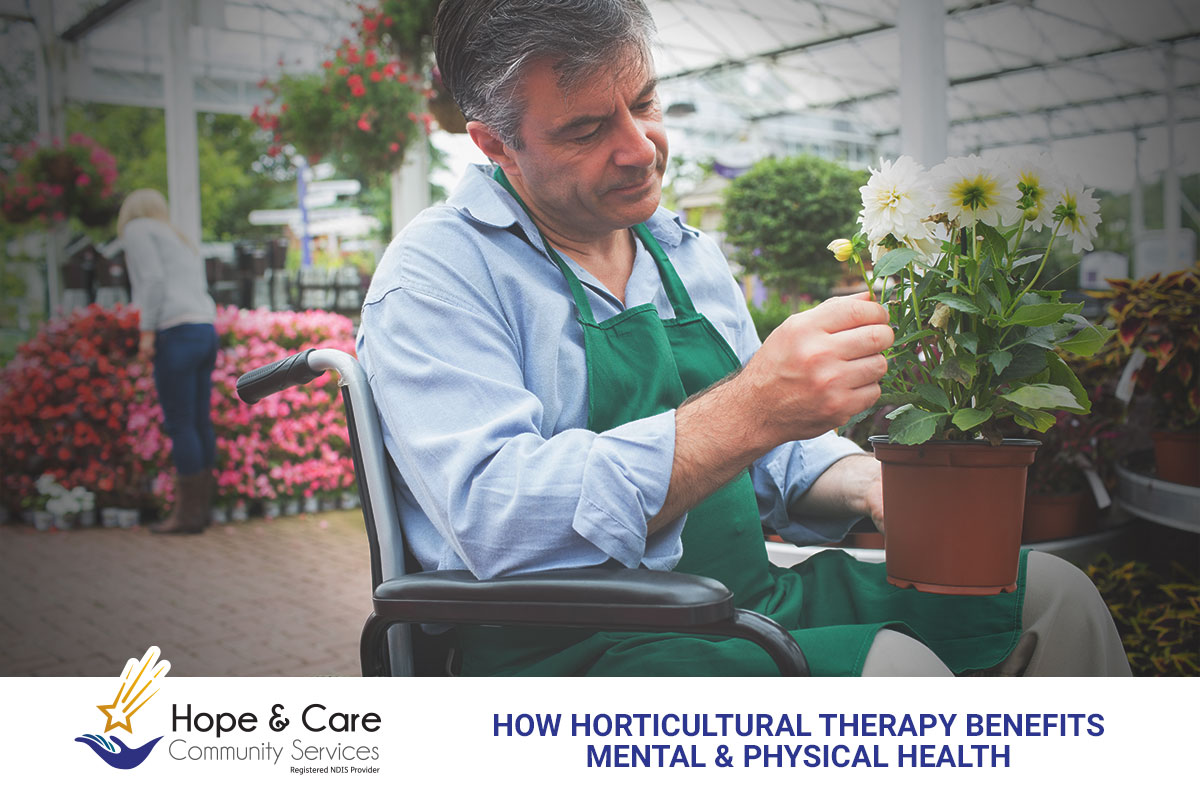
As spring arrives and gardens come to life, there’s no better time to explore how gardening can benefit your health. For NDIS participants across Queensland and Australia, Horticultural Therapy the use of structured gardening for therapeutic purposes is not just a relaxing hobby, it is a powerful, evidence-based activity that supports physical, emotional and social wellbeing. Best of all, it can be included in your NDIS plan.
What Is Horticultural Therapy?
Horticultural therapy uses structured gardening and plant-based activities to improve an individual’s physical, cognitive, emotional and social functioning. Whether planting flowers, growing vegetables or maintaining a shared garden space, participants engage in activities that align with their goals under the NDIS Capacity Building and Community Participation categories.
This form of therapy is accessible, adaptable and inclusive making it ideal for people with disabilities, sensory challenges or mental health conditions.
Key Benefits of Gardening for People with Disability
Gardening provides many benefits across physical, mental, cognitive and social health. As part of your NDIS-funded supports, it can be delivered one-on-one or as part of a group.
Physical Health Benefits of Gardening
Improve Mobility and Strength
Gardening activities such as digging, planting, lifting and watering offer low-impact exercise that helps maintain flexibility and strength. Using adaptive gardening tools and raised garden beds, we ensure everyone can participate safely and comfortably.
Develop Fine Motor Skills
Tasks like handling seeds or using small tools help improve hand-eye coordination and fine motor function, supporting everyday activities like writing, eating and self-care.
Promote Vitamin D and Outdoor Activity
Gardening outdoors encourages safe sun exposure, helping to increase vitamin D levels, which support bone health, immune function and energy levels.
Mental Health Benefits of Horticultural Therapy
Reduce Stress and Anxiety
Being in nature and engaging with plants promotes calm and reduces stress. Gardening can lower cortisol levels and encourage a sense of mindfulness, helping participants feel more relaxed and in control.
Boost Mood and Confidence
Seeing a plant grow from seed to bloom builds a sense of accomplishment. Gardening activates dopamine and serotonin in the brain natural chemicals that improve mood and support emotional regulation.
Encourage Routine and Purpose
Gardening provides a structured activity with clear goals, routines and outcomes. This helps participants develop a stronger sense of purpose and routine both important for mental wellbeing and NDIS daily living skills.
Social and Community Benefits of Gardening
Encourage Social Interaction
Gardening with others builds connection. Participants can chat while planting, collaborate on tasks and share their successes leading to improved social inclusion and communication skills.
Foster Teamwork and Responsibility
Whether it is working in a community garden or sharing tasks at home, gardening encourages collaboration, role-sharing and responsibility all of which support greater independence and confidence.
Create a Sense of Belonging
Maintaining a shared space gives participants a sense of pride in their environment. This feeling of ownership and contribution helps strengthen their connection to the wider community.
Cognitive and Sensory Benefits
Improve Attention and Memory
Gardening requires planning, sequencing and follow-through. These tasks build cognitive function, help with short-term memory and improve focus especially beneficial for people with developmental or cognitive disabilities.
Stimulate the Senses
Gardening is a multi-sensory experience. Participants engage with textures, scents, colours and sounds, which support sensory regulation and calmness particularly helpful for individuals with autism or sensory sensitivities.
Support Lifelong Learning
Gardening teaches concepts such as growth cycles, nutrition, weather patterns and sustainability. It also helps build practical skills that participants can use in other areas of life, such as meal preparation, health awareness and self-reliance.
Can Gardening Be Funded Through the NDIS?
Yes. Gardening can be included in your NDIS plan under supports such as:
- Community and Civic Participation
- Improved Daily Living Skills
- Capacity Building Supports
- Therapeutic Support or Allied Health Services
Speak with your NDIS plan manager, support coordinator or local area coordinator (LAC) to include gardening in your plan.
Accessing Horticultural Therapy Through the NDIS
While not all providers offer direct gardening services, Horticultural Therapy can still be included in your NDIS plan if it aligns with your goals. This support can be accessed through providers who specialise in therapeutic gardening, community programs or allied health services focused on improving daily living and wellbeing.
Participants can work with their:
- Support Coordinator to find local gardening programs or therapeutic services
- Plan Manager to ensure the right funding categories are used
- Allied Health professionals to integrate horticultural goals into broader therapy plans
Whether it is joining a community garden, participating in a sensory gardening group or working one-on-one with a trained facilitator, Horticultural Therapy is a flexible, inclusive way to promote physical activity, mental health and social connection through nature-based care.
Tips to Start Your Own Garden
Here’s how to begin gardening at home or in your local community:
- Start with simple plants: Herbs, lettuce and marigolds are great for beginners
- Use raised beds or vertical gardens if space or mobility is limited
- Schedule regular gardening times to create consistency
- Track progress with a photo diary or garden journal
- Celebrate milestones every new sprout is a reason to smile
Final Thoughts
Gardening is not just a feel-good activity it is a proven way to build physical strength, boost mental health, foster community connection and promote independence. For many NDIS participants, gardening offers the structure, stimulation and joy that traditional therapies cannot always provide.
At Hope & Care Community Services, we proudly support individuals to explore nature-based therapy as part of their NDIS journey. Whether you are new to gardening or rediscovering it as a form of care, our team is here to guide, support and grow with you. Let’s plant the seeds of wellbeing together.
Want to learn more? Read other articles :
- Redefine Independence your own way – with HCCS
- Who’s Who: The Key Terms of Your NDIS Plan
- Foundational Supports: Building Blocks of NDIS Success
HCCS is a registered NDIS provider. Learn more about our services.
♥ We are available in Brisbane! – Our team is just a call away!
